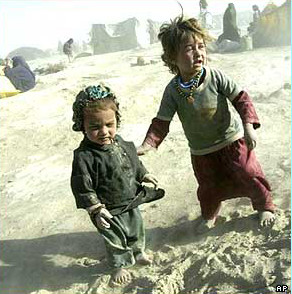Mark Sedwill's claim that children in Kabul are better off than those in many western cities (Children safer in Kabul than in Glasgow, says Nato spokesman, 22 November) deserves attention, not because it is accurate (which it is not) but because it illustrates a shocking disregard by senior Nato officials for the dire situation of children in Afghanistan.

BBC Persian, Nov. 22, 2010: Children in Kabul say that they feel scared in their daily life for different reasons and lose their peace of mind due to these fears.
A 12-year old who had witnessed a suicide attack said, “I am afraid of suicide attacks, kidnappings and car accidents. The minute I leave my home I am scared that another suicide attack may take place and I may die or get injured.”
An 11-year old boy said that he is afraid of getting lost or kidnapped by kidnappers who might take him to bad places. Another 12-year old said that the fear of hunger has stolen his tranquility.
In our June 2010 report on Afghanistan, we called on world leaders to put children's needs at the forefront and to bring those who commit violations against children to justice. Yet major opportunities to prioritise the concerns of children have been missed, with disastrous consequences. During the 2010 parliamentary elections, for instance, Afghanistan's independent election commission once again used school buildings as polling stations, thereby endangering children and preventing them from attending classes.
We hear of families in Afghanistan who are afraid even to let their children leave home. In 2009, more than 1,000 children were killed by aerial strikes, night raids, suicide bombings, landmines and other explosives. In the same year, the UN in Afghanistan recorded the highest number of attacks against education in the world, primarily targeting schools, students (especially girls) and teachers. Children are really suffering in Afghanistan, and the government and its partners must take responsibility and protect them.
We hope Sedwill's tenuous comments lead to an overdue discussion among Nato's leadership and troop-contribution countries about setting the right priorities in a country where more than half the population is younger than 18.
Eva Smets
Director, Watchlist on Children and Armed Conflict, New York
• The claim made by Mark Sedwill that children in Kabul are "probably safer" than those living in London or New York trivialises the danger and deprivation that Afghan children face every day. A report we commissioned in September revealed that Afghanistan was the 17th worst place in the world to be a schoolchild. Approximately 7 million children are out of school, and in some rural regions 92% of girls do not attend. While enrolment in education has increased, there is a huge task to ensure the quality of schooling helps change the opportunities for the next generation of Afghans.
The total cost of US-led military intervention in Afghanistan is expected to rise to above $500bn. If just 1% of the money spent on US-led military activity in Afghanistan went into funding education in the country, every child would be able to go to school. Perhaps when this is a reality, comparisons such as Sedwill's would be fairer to make.
Kailash Satyarthi
President, Global Campaign for Education, Johannesburg, South Africa



